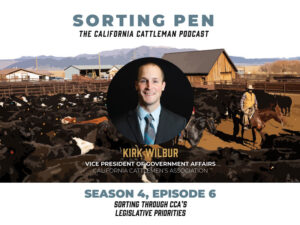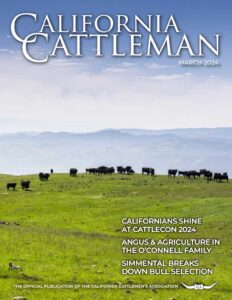
CALIFORNIA CATTLEMAN WEEKLY
March 25, 2024
To read the full version each week, please subscribe below.
U.S. Senate Votes to Block Paraguayan Beef Imports; Resolution Moves to the House
The United States Senate voted on Thursday to block a rule by the U.S. Department of Agriculture permitting the importation of fresh chilled or frozen beef from Paraguay despite the South American nation’s concerning animal health record. Given that Paraguay has a significant history of foot-and-mouth disease and that USDA relied on data and site visits from 2008 and 2014, CCA and our national partners at the National Cattlemen’s Beef Association have strongly opposed importation of Paraguayan beef. Despite these objections, USDA’s Animal and Plant Health Inspection Service last November approved a final rule lifting the longstanding ban on beef imports from Paraguay.
The resolution advanced by the Senate Thursday, Senate Joint Resolution 62, would provide that “Congress disapproves the rule submitted by the Animal and Plant Health Inspection Service relating to ‘Importation of Fresh Beef From Paraguay’… and such rule shall have no force or effect.”
The resolution passed by a vote of 70-25 in the upper chamber, with split votes from California’s senators. Senator Alex Padilla voted in favor of the resolution, with Laphonza Butler voting against it.
The resolution will now advance to the House of Representatives for that chamber’s consideration. Should the resolution advance, it will then head to President Joe Biden’s desk. While President Biden has not issued a formal veto threat, the White House has said it “strongly opposes passage of S.J. Res. 62” (should a veto occur, Congress could potentially override it with a two-thirds vote of each house).
CCA will continue to keep members up-to-date regarding the status of S.J. Res. 62; for additional information, see NCBA’s press release.
HPAI Detected in Dairy Cattle
From the National Cattlemen’s Beef Association (NCBA)
The National Cattlemen’s Beef Association (NCBA) is aware that the U.S. Department of Agriculture (USDA) and the U.S. Food and Drug Administration (FDA) confirmed Highly Pathogenic Avian Influenza (HPAI) in samples collected from dairy cattle in the United States. Importantly, the agency confirmed there is no threat to human health, and milk and meat remains safe to consume. USDA has confirmed that affected dairy cows do not appear to be transmitting the virus to other cattle within the same herd.
At present, HPAI has not been detected in beef cattle. However, producers are encouraged to implement enhanced biosecurity measures on their farms and ranches to help protect their herds. For more information on animal health protocols and developing an effective biosecurity plan, cattle farmers and ranchers are encouraged to visit www.bqa.org, and complete or update their certification in Beef Quality Assurance practices. Producers can also visit usda.gov for resources on how to manage wildlife to limit exposure to HPAI.
2024 Nevada-Placer-Yuba Livestock Access Program Registration
From UCCE Livestock Natural Resources Advisor Placer-Nevada-Sutter-Yuba
Ranchers in Placer, Nevada, and Yuba Counties, along with UC Cooperative Extension (UCCE) and the County Agricultural Departments from these three counties, have established a Disaster Livestock Access Program to facilitate livestock and human safety before, during, and after wildfire and other emergencies.
Evacuating livestock from commercial ranching operations may not be possible in the event of a major incident, due to scale of operation. Sheltering-in-place may be the best and safest alternative. Safe access by trained and qualified ranch personnel is critical to livestock welfare, firefighter safety, and public safety. The geographic scope of this project aligns with the CALFIRE administrative unit for the region (Nevada, Placer, and Yuba Counties).
Livestock Access Passholders may be permitted into evacuation zones, or other restricted areas, to provide feed, water, medical treatment, and other care to commercial livestock.
Qualified Commercial Livestock Operator: For the purposes of this program, a commercial livestock operator is defined as owning/managing 50+ head of livestock (including in utero, e.g., 25 bred cows), 100+ poultry or rabbits, or 50+ beehives that reside in Placer, Nevada, or Yuba County for at least a portion of the year, or a person who, through an agreement with that owner of livestock, has authority and is responsible to oversee the care and well-being of the livestock. This program applies to commercially raised species of livestock, including cattle, sheep, goats, hogs, poultry, rabbits, llamas, alpacas, and bees. “Commercially raised” means the livestock are raised as part of a business.
Application for Registration: To enroll in the program, a Commercial Livestock Operator must provide contact information, APNs and/or physical addresses of grazing sites, general season(s) of use, livestock description and count, and other information by completing the online form at https://ucanr.edu/2024newlivestockpass. For assistance completing the online registration, contact Dan Macon at (530) 889-7385 or dmacon@ucanr.edu. Please note that ranch owners, family members, and managerial employees are eligible to participate. Employees who receive hourly pay are not eligible.
Mandatory Training: A new Commercial Livestock Operator must complete an initial 4-hour training. Trainings will be offered in late April and early May. Meeting details will be provided upon registration for the program. Ranchers who received a pass in prior years will need to complete a 1-hour virtual training session.
For more information: Contact Dan Macon, UCCE Livestock and Natural Resources Advisor (Placer-Nevada-Sutter-Yuba) at dmacon@ucanr.edu or (530) 889-7385.
Upcoming CCA Events
2024 Feeder Meeting
May 22-23, 2024, San Diego, CA
The 2024 Feeder Meeting will take place at the San Diego Hilton Bayfront, May 22-23. For further information about the event and to book your room click here. To register, click here.
2024 Midyear Meeting
June 26-27, 2024, Nugget Casino Resort, Sparks, Nev.
This year’s Midyear Meeting will be at the Nugget Casino Resort. For more details on how to reserve your room, click here. Look for more details on the meeting schedule and for registration to be posted in the coming weeks.
Upcoming Industry Events
UCCE Livestock Health and Wildfire Webinar
March 28, 2024, 6:00-7:30 pm, Virtual
The University of California Cooperative Extension – Placer-Nevada-Sutter-Yuba is hosting a Livestock Health and Wildfire Webinar on Thursday, March 28 from 6:00-7:30pm and costs $10. The webinar’s speakers include UC Davis Livestock Extension Veterinarians and the new Disaster Preparedness Specialist discussing how to manage livestock during fire season. To view the flyer, click here. To register, click here.
2024 NCBA Legislative Conference
April 17-19, JW Marriott, Washington, D.C.
The 2024 NCBA Legislative Conference will take place April 17-19 at the JW Marriott in Washington D.C. The conference provides attendees the opportunity to join NCBA’s policy team in meeting with members of Congress, and agency officials and hearing from various guest speakers. To learn more about the event and to register, click here.
CCA in the News
Fire officials, local ranchers discuss use of prescribed burns in prep for fire season KSBY “‘If you look at big fires like the Carr Fire or the Sonoma fires, a lot of those fires were stopped on private ranches,’ said Anthony Stornetta, California Cattlemen’s Association fire committee chair. ‘Once it gets into the structures, it’s very difficult to stop a fire, so doing these prescribed fires and providing escape routes, safety zones for our community, our firefighters, that’s key for any success in stopping a large fire.’” To continue reading, click here.
Industry News
Federal and State Veterinary, Public Health Agencies Share Update on HPAI Detection in Kansas, Texas Dairy Herds USDA Animal and Plant Health Inspection Service“The U.S. Department of Agriculture (USDA), Food and Drug Administration (FDA) and Centers for Disease Control and Prevention (CDC), as well as state veterinary and public health officials, are investigating an illness among primarily older dairy cows in Texas, Kansas, and New Mexico that is causing decreased lactation, low appetite, and other symptoms.” To continue reading, click here.
Bill introduced by Congressmen LaMalfa & Vazquez on animal grazing to mitigate wildfire KRCR “Northstate Congressman Doug LaMalfa along with New Mexico Congressman Gabe Vazquez introduced legislation on Thursday to encourage animal grazing to help mitigate wildfires.” To continue reading, click here.
State Farm discontinuing 72,000 home policies in California NBC Los Angeles “State Farm will discontinue coverage for 72,000 houses and apartments in California starting this summer, the insurance giant said this week, nine months after announcing it would not issue new home policies in the state.” To continue reading, click here.
A new episode of Sorting Pen: The California Cattleman Podcast is out now! On this week’s episode, CCA’s Vice President of Government Affairs Kirk Wilbur joins Katie to chat about CCA’s legislative priorities. To listen, click here.



